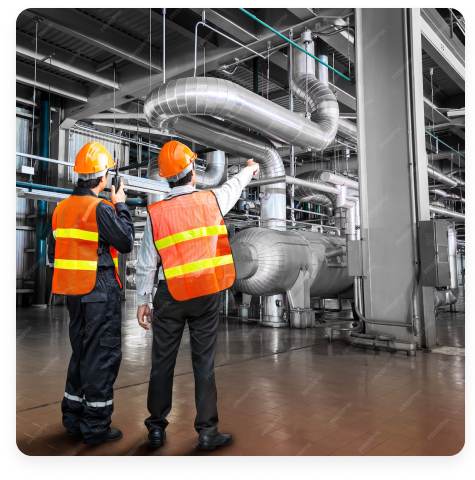Oil Process Facilities
Discover inclusive approach to oil process facilities and optimize your resource integrity with our in-depth training. Indonesia & Malaysia based 5-day course
Level
Basic
Type
Facetoface

Trusted by Leading Companies
Our training programs are promoted to engineers, supervisors, and technical teams across the globe, supporting their continuous development and operational competency.












About Training
This course is designed to ensure awareness and effective understanding of various phases of production operations fundamentals through understanding the functions of various oil field components from the well to processing facilities.
The course also addresses and emphasizes the fundamental understanding of the wide range of oilfield production handling and treatment equipment not only “what” but “how” the field fluid treating equipment works. The major objective of this course is to improve communication among the technical disciplines across organizations in order to enhance operational and cross-functional work performance, promote cooperation and teamwork spirit among the team across various organizations, optimize cost, and improve production economics. This can be the operator’s best insurance to achieve successful safe and cost-effective operations
Training Objectives
What is Oil Process Facilities training course objective?
- Understand surface facilities components from well to production station
- Understand the principles of Oil & Gas Separation
- Understand the principles of Oil & Gas Dehydration
- Familiarize with the principles of Fractionation & Operations
- Familiarize with the principles of Refrigeration Operations
- Understand and Identify the Operating problems
- Familiarize with the Pipeline Operations & Maintenance, Problem & Troubleshooting
- Familiarize with the Pipeline Pigging Operations
- Familiarize with types of Storage Tanks, Associated Hazards & Safety
- Familiarize with various equipment and tools and their function
Audiences
Who should join Oil Process Facilities training course by PetroSync?
- Production Engineers with 0-10 Years of Experience
- Operation Engineers with 0-10 Years of Experience
- Facilities Engineers with 0-10 Years of Experience
- Petroleum Engineers with 0-10 Years of Experience
- Field Production Supervisors with 0-10 Years of Experience
- Surface Equipment Technicians with 0-10 Years of Experience
- Field Facility Engineers / Operators with 0-10 Years of Experience
Instructor
ME
Magdi El Naggar
Magdi El Naggar is officially Certified as Professional Petroleum Engineering Consultants (License 116/7). He has 46 years of professional experience n various phases of Petroleum Engineering including Petroleum/Reservoir/Production/Drilling & Workover Engineering as well as field operations with several multi-national international companies including ARAMCO (Saudi Arabia) and ADNOC (UAE). He has extensive professional experiences in all phases of well intervention operations including coiled tubing, especially during well emergency cases, well control and extended reach operations.
He specialized in well intervention operations, especially, during emergency cases and well blowouts. He also has extensive experiences in full field development studies, Production Enhancement for oil fields as well as various types of wells, CO2 Injection and EOR operations, IWCF & IADC certification.
Daily Aims
DAY 1 - Module 1, 2 and 3
Pre-Course test
Module 1: Introduction and Overview
- Properties of fluids, viscosity, density, solubility,
- compressibility, and surface tension at the surface.
- Effects of fluid properties on a production system
- Phase envelop, dew/bubble points, dense phase, critical point, hydrocarbon mixture
- Laws: Stokes, Bernoulli, Darcy, Reynolds
Module 2: Integrated Production System
- Reservoirs: types, drive mechanisms, porosity, permeability, skin
- Wells: Types and objectives
- Surface facilities: Configurations and objectives
- Flowlines, piping, gathering systems; solids, and liquid limits
- Production measurements and types of meters
- Disposal: types and environmental impact
- Nodal analysis: pressure drop over the system
Module 3: Sub-surface Operations
- Well types: vertical, deviated, casing schemes, cementation, completion classification, packers, perforations, tubing standards, and tubing connections.
- Vertical flow performance: multi-phase flow
- Well integrity: well intervention operations, workover, snubbing, coiled tubing, acid treatment, pressure control, SSSV, MAASP
- Artificial lift: gas lift, beam pump, ESP, etc.
- Group discussion & exercises
DAY 2 - Module 4, 5 and 7
Quizzes & Recap
Module 4: Wellhead & X-mas Tree
- Types of casing and objectives
- Casing head housing/spools
- Tubing hanger: Tubing hanger systems and
- components, types
- X-mas tree: types, valves, API standard
Module 5: Flow Control and Manifolds
- Chokes: fixed, variable, critical flow, erosion
- Flowlines: horizontal flow performance: multi-phase flow, vertical flow phases
- Manifold layout
Module 6: Separation
- 2 and 3 phase separation, multi-stage separation, effects of separator pressure, the internals of separators, vertical/horizontal separators, retention time.
- Atmospheric separation, surge vessels
Module 7: Oil Treatment
- Wash tanks, storage/export tanks,
- Emulsion treatment, dehydration/desalting of crude
- Solids in oil
- Export/sales quality and market requirements
- Case Study:
- Emulsion
- Reservoir and emulsion aspects
DAY 3 - Module 8, 9, 10 and 11
Quizzes & Recap
Module 8: Pipeline Systems
- Operations
- Maintenance
- Inspection of pipelines
- Best practices of pipeline pigging operations
- Cathodic protection and corrosion monitoring through pigging operations
Module 9: Water Treatment
- Water quality: oil in water, disposal at surface/sub-surface, water injection, hydro cyclones
Module 10: Reserves Planning
- PRMS: Petroleum Resource Management System
- Portfolio management
Module 11: Gas Treatment
- Gas coolers: water in the gas, isobaric dehydration
- LTS: mechanical cooling, J-T valves, turboexpander
- Absorption: glycol systems, regeneration, contactor, quality, filters
- Adsorption: silica gel systems, batch operation
- Acid gas treatment
- Case Study:
- Produced water treatment & recycling
- Wash water quality and role in the oil separation process?
DAY 4 - Module 12, 13, and 14
Quizzes & Recap
Module 12: Corrosion
- Corrosion mechanisms
- CO2, H2S, Chlorine, brittle fractures, HIC
- Galvanic corrosion
- Corrosion detection, management, and protection
Module 13: Rotating Equipment
- Pumps
- Compressors (reciprocating, centrifugal)
Module 14: Static Equipment
- Heaters
- Vessels
- Valves
- Regulators
- Case Study:
- 3 case studies by participants?
DAY 5 - Module 15, 16, 17 and 18
Module 15: Instrumentation
- Measurement equipment: end elements, DCS / SCADA
- Safety equipment: IPF, HIPPS, voting systems
- Fiscal measurements
- Reliability: SIL, FoD, risk
Module 16: State-of-the-Art Systems
- New developments
Module17: Oil Storage & Shipping Facilities
- Tanks and Tank Storage facilities
- Types of Storage Tanks
- Associated Hazardous Conditions
Module18: HSE Requirements
- Authorization and Competency of Production
- Personnel
- General Safety Procedures
- Handling Chemicals
- Post-course test
Training Schedule
Why Choose This Training
Credibility
Align with API/ASME standards. Trusted by major operators.
Expert Instructors
Led by industry veterans with real field experience.
Real Case Studies
Practical application of concepts through real world scenarios.
Practical Skills
Hands on calculations and decision making for FFS outcomes.
Trusted by Operators
Delivered to Aramco, ADNOC, SABIC, and other major operators.
Global Training Standard
Recognized across major industries by PetroSync's proven approach.
Professional Training Aligned with Industry Standards
Practical, industry ready training designed for real work environments
Limited seats available

Frequently Asked Questions
-
Direct Transfer
PetroSync Global Pte Ltd Bank Details:
- Account Name: PetroSync Global Pte Ltd
- Bank Name: DBS Bank Ltd
- Bank Code: 7171
- Bank Swift Code: DBSSSGSGXXX
- Branch Code: 288
- Account No: 0288-002682-01-6-022 (USD)
- Bank Address: 12 Marina Boulevard, Level 3, Marina Bay Financial Centre Tower 3, Singapore 018982
-
Terms & Conditions:
- For payment via direct telegraphic transfer, clients must bear both local and overseas bank charges.
-
Credit Card:
Terms & Conditions:
- A 4% credit card processing fee applies for credit card payments.
- Delegates who cancel after the training has been officially confirmed via email are required to pay the full course fee, and no refunds will be granted. However, you may substitute delegates at any time as long as reasonable advance notice is given to PetroSync.
- If PetroSync cancels, postpones, changes the trainer, or alters the training location (classroom/virtual) for any reason, and the delegate is unable or unwilling to attend on the rescheduled date, a 100% credit voucher of the paid contract fee will be issued. This credit voucher can be used for another PetroSync training program, subject to mutual agreement, within one year from the postponement date.
- PetroSync is not responsible for any loss or damage resulting from the cancellation policy and assumes no liability if the event is canceled, rescheduled, or postponed due to force majeure (e.g., natural disasters, war, government actions, industrial actions).
If PetroSync cancels, postpones, changes the trainer, or alters the training location (classroom/virtual) for any reason, and the delegate is unable or unwilling to attend on the rescheduled date, a 100% credit voucher of the paid contract fee will be issued. This credit voucher can be used for another PetroSync training program, subject to mutual agreement, within one year from the postponement date.
Yes, participants who complete the training will receive either an attendance certificate or a completion certificate, depending on the course requirements.
Yes, PetroSync courses adhere to international standards , with expert instructors in fields such as API, ASME, Reliability, and Drilling & Well Engineering.
Yes, PetroSync certificates are widely recognized and can be used to fulfill professional development and certification requirements across various industries.
Yes, PetroSync offers customized training programs tailored to your organization's specific needs (In-house Training).
Participants will receive comprehensive training materials , including slides, handouts, and direct learning from experts with case studies related to the training topic.
PetroSync trainers are industry experts with extensive experience as instructors and consultants in their respective fields, providing professional training with a strong background in the industry.
Yes, trainer profiles, including their qualifications, experience, and expertise, are available on the website: https://www.petrosync.com/training/.
Online training sessions are conducted via user-friendly platforms such as Zoom Premium.
To access PetroSync Online Training, participants need:
- A computer or laptop (tablets or smartphones are not recommended)
- A reliable broadband internet connection (minimum 4 Mbps)
- A webcam and a headset
- Any internet browser (Chrome browser recommended for a better experience)
- A reasonably quiet place
Yes, PetroSync provides live Q&A sessions with instructors to address real-world challenges encountered during training.
The average number of participants varies depending on the topic and participants’ schedules.
- The information you provide will be safeguarded by PetroSync and may be used to keep you informed of relevant products and services.
- As an international group, we may transfer your data globally for the purposes indicated above.
- If you do not wish to share your information with other reputable companies, please tick the box on the registration form.
Please fill out the form on the designated page first. Our team will reach out to you within a maximum of 2x24 hours.
The latest training schedule is available on the website: https://www.petrosync.com/training/.
